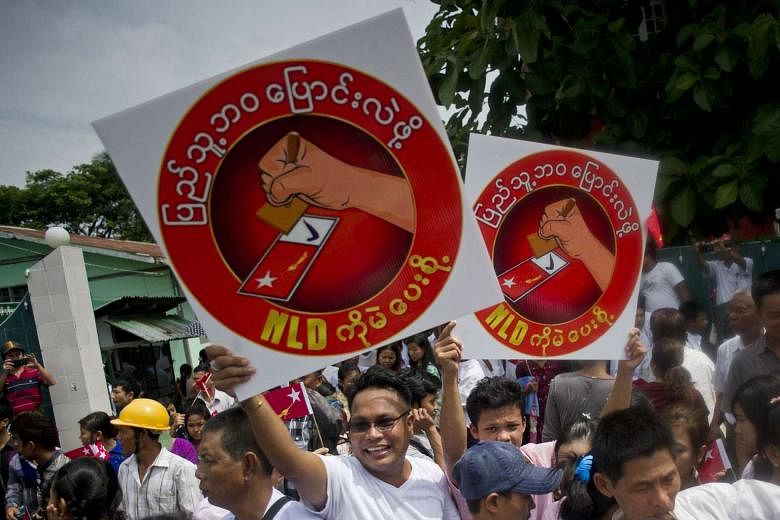YANGON (AFP) - Myanmar's ruling party Wednesday admitted it was facing big losses in a general election likely to be swept by Aung San Suu Kyi's opposition, as tensions mount between its leader and the powerful army.
The Union Solidarity and Development Party (USDP), the semi-civilian reincarnation of the previous junta which is packed with former soldiers, won a landslide in dubious 2010 elections when it ran virtually unopposed, as Suu Kyi remained under house arrest and her party boycotted.
But a sense of pessimism is already settling in ahead of the November polls.
"We don't expect a winning result like in 2010. It's impossible," USDP general secretary Maung Maung Thein told reporters at an event announcing Yangon regional candidates.
The admission comes as relations have soured dramatically between the still powerful army and the party's influential leader and parliamentary speaker Shwe Mann, who is widely considered a presidential hopeful.
Shwe Mann has faced opposition from soldiers in his constituency in recent days over his readiness to support Suu Kyi in her efforts to change the constitution, which bars the opposition leader from top political office.
But the former junta number three posted comments on his official Facebook page insisting he acted "in the interest of the country" and suggested he was ready to defy both the army and President Thein Sein.
Recalling a recent interview where he was asked if he would stand with Suu Kyi against the president and the army chief, he said it would be more exact to say he was with Suu Kyi and "the people".
The soldiers' hostility to Shwe Mann has cast doubts over the political allegiances between the ruling party and the military that spawned it, heightening uncertainty as the country heads towards elections.
Myanmar began emerging from military rule after the 2010 polls with a new government led by Thein Sein that has introduced broad political and economic reforms that have cracked open decades of isolation and heralded an investment rush in the resource-rich nation.
But Suu Kyi, who entered parliament in 2012, has warned that reforms have stalled, with activists locked up and press freedoms curtailed.
She remains excluded from the presidency because of a clause in the junta-drafted 2008 constitution that bans those with foreign children. Her two sons are British.
The military, which occupies a quarter of seats in the legislature, has staunchly refused to countenance a reduction of its political role.
Last month, it voted down a raft of charter change draft bills including one that would have removed its veto on constitutional amendment.

